The argument against the Dunning-Kruger effect that ``the lower your ability is, the more you overestimate yourself'' calls for further objections.

The Dunning-Kruger effect is a hypothesis about the cognitive bias that ``people with low ability tend to overestimate their ability.'' Political economist Blair Fix and data scientist Daniel Anderson have posted their opinions on their blogs as to whether this effect really exists.
The Dunning-Kruger Effect is Autocorrelation – Economics from the Top Down
I can't let go of “The Dunning-Kruger Effect is Autocorrelation” | andersource
https://andersource.dev/2022/04/19/dk-autocorrelation.html
◆What is the Dunning-Kruger effect?
The Dunning-Kruger effect was first reported in 1999 by David Dunning and Justin Krueger of Cornell University. The two had a large number of people take a skill test, and had the test takers self-evaluate their abilities by asking, ``Where do you think you are?''
The results are illustrated in the graph below, where the vertical axis is the percentile value of the rank, and the horizontal axis is the examinees divided into four groups of 25% each from the top score. The line plotted with ● indicates the actual score, and the line plotted with ■ indicates the examinee's self-evaluation.
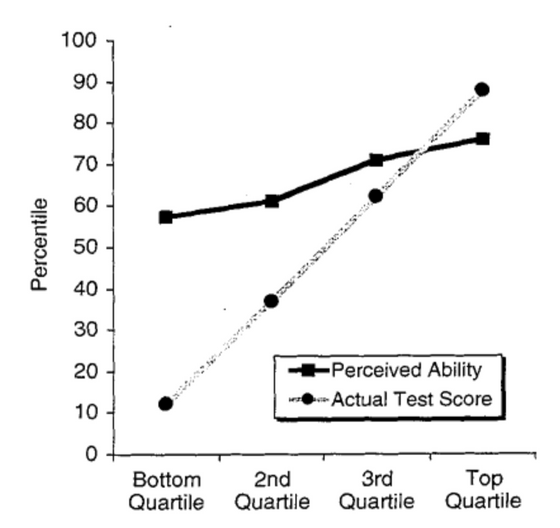
People who are classified as 'Bottom Quartile' with low test scores have a higher position of ■ than ●, and it can be observed that their self-evaluation tends to be excessive.
◆Opinion that “Dunning-Kruger effect does not exist”
Blair Fix says, ``The Dunning-Kruger effect has nothing to do with human psychology and is just an autocorrelation,'' and provides a procedure for finding the Dunning-Kruger effect from random numbers as evidence.
Autocorrelation is a correlation that occurs when variables have a common factor. For example, set two variables x and y randomly as shown below.
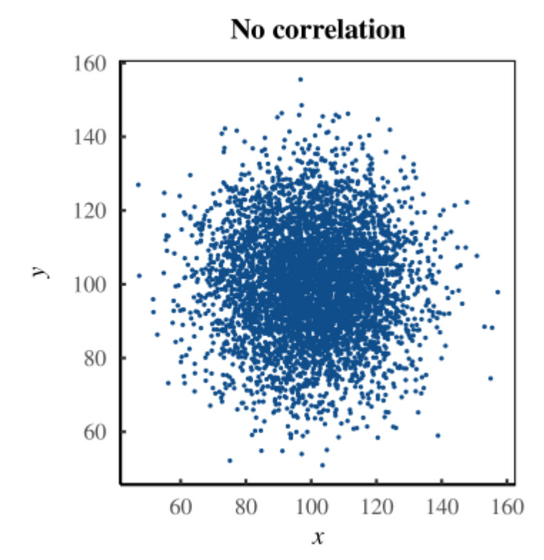
If we examine the correlation between variables z and x, where 'z = x + y', we will find a clear correlation as shown in the figure below. When the contents of z are clear like this, it sounds too obvious and ridiculous, but problems occur when we do not notice the existence of these common factors.

In the figure below showing the existence of the Dunning-Kruger effect, if the actual score is 'x', both the vertical and horizontal axes are based on the actual score, so the 'Actual Test Score' line is simply 'x and x This is a graph that plots ``.
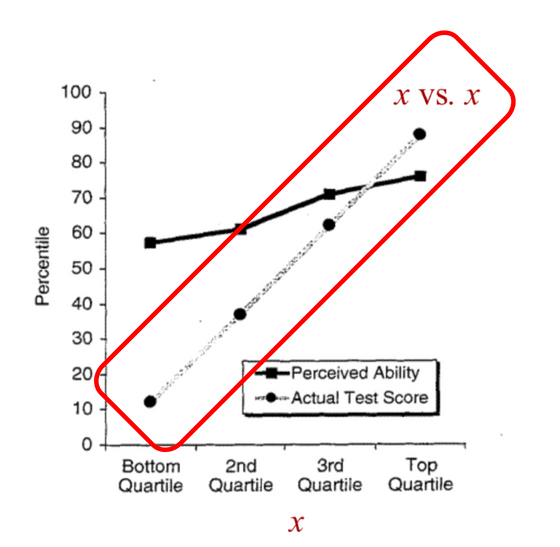
On the other hand, the 'Perceived Ability' line is plotted based on the self-evaluation of each group, so if the self-evaluation is 'y', it is a graph plotting 'y and x'.
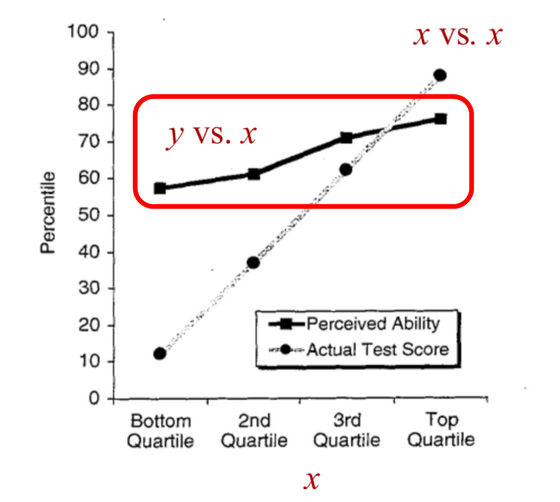
Dunning and Krueger proposed the Dunning-Kruger effect by focusing on the difference between the two lines, the 'difference between self-evaluation and actual score.' If we express the 'difference between self-evaluation and actual score' by y and x, we get 'y - x.'
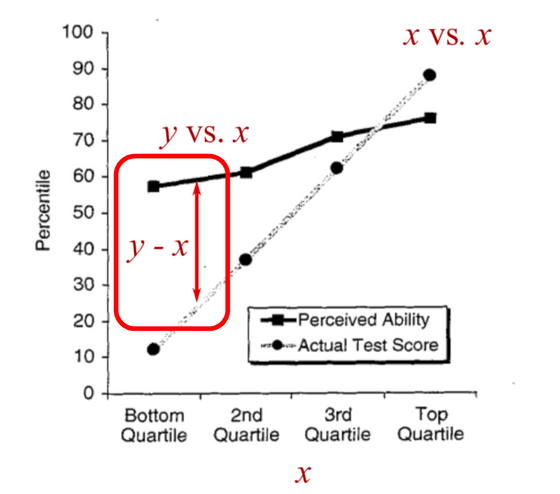
The Dunning-Kruger effect, which states that ``people with low ability tend to overestimate their own ability,'' is actually just stating the obvious content that ``y - x becomes larger as x becomes smaller.'' Mr. Fix insisted.
According to Mr. Fix, it is possible to find the Dunning-Kruger effect even based on random numbers. First, the actual score and self-evaluation are set completely randomly as shown below.
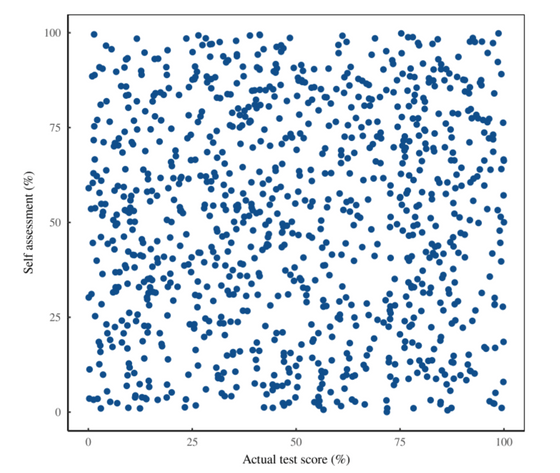
When calculating the 'difference between self-evaluation and actual score' based on the above data, the result is that 'the lower the actual score, the higher the self-evaluation', as shown in the figure below.
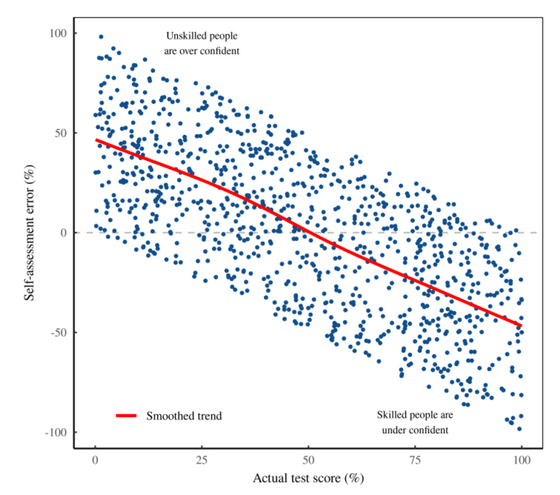
The diagram below shows the same expression as Dunning-Kruger. The Dunning-Kruger effect, which should not exist, can be observed from completely randomly set data.
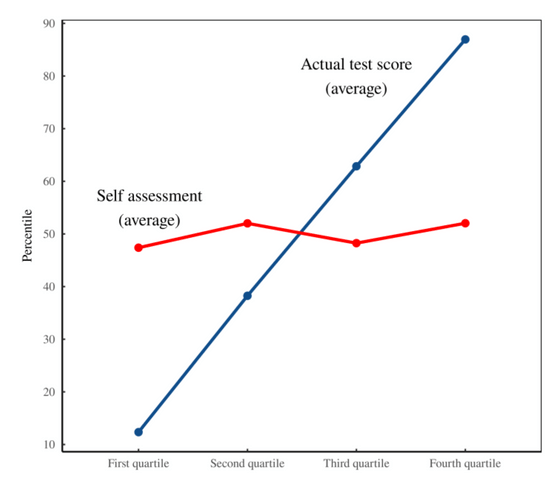
Fix is not the only one who noticed this problem. For example, Edward Knufer, who was a faculty member at California State University, also focused on this problem and conducted
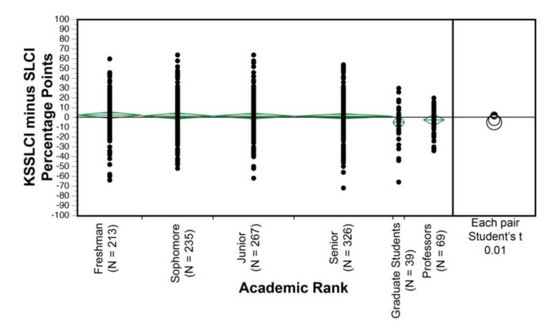
Based on this evidence, Mr. Fix stated, ``The Dunning-Kruger effect arises from statistical errors, not human psychology,'' and in response to the Dunning-Kruger paper, which states that ``inexperienced people also have immature self-awareness,'' ``The authors of the paper He quipped, 'Not only was I immature, I was not aware of my immaturity.'
◆Rebuttal: “The fact that the Dunning-Kruger effect can be observed with random number data does not deny the existence of the Dunning-Kruger effect.”
Regarding Fix's opinion, Daniel Anderson said that the reason why the Dunning-Kruger effect can be found in random numbers is because 'human beings are completely unable to evaluate themselves correctly,' or in other words, 'human beings' ability to recognize themselves is close to that of random numbers.' , argued that this was not a flaw in the Dunning-Kruger paper.
Mr. Anderson made the assumption that ``what if humans could make fairly accurate self-evaluation'' and generated data that would generate a correlation between self-evaluation and actual scores.
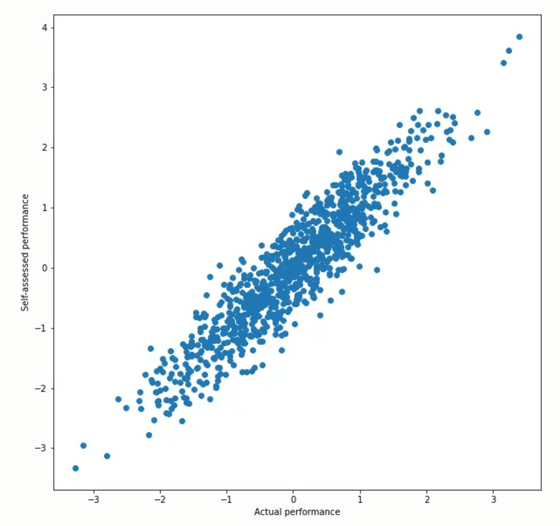
Here, just like when Mr. Fix plotted 'y - x', take the 'difference between self-evaluation and actual score' on the vertical axis. We will be investigating the correlation between 'y - x' and 'x', but 'y - x' represents the residual, which is the difference between the estimated value and the actual value, and is not a particular problem from a statistical perspective. That's what he said. The result is as shown in the figure below, where there is no correlation even though there is autocorrelation.
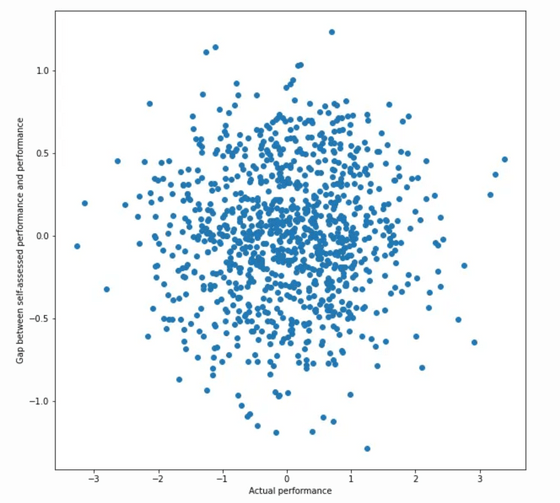
This contradicts Dunning and Krueger's experimental results, which shows that Anderson's assumption that humans could make fairly accurate self-assessments was incorrect. Anderson did not go into the question of whether there is a Dunning-Kruger effect, but even with autocorrelation it is possible to reveal human psychology statistically, and at least the Dunning-Kruger effect can be observed from random numbers. He states that what can be done is not grounds for denying the Dunning-Kruger effect, nor does it point out any flaws in the paper that discovered the Dunning-Kruger effect.
After expressing this opinion, Anderson said that Fix called Dunning and Krueger 'unaware of their immaturity,' and that people easily echoed Fix's argument in the comments section of the news site Hacker News. I expressed my anger at him for jumping on me.
◆Forum now open
A forum related to this article has been set up on the GIGAZINE official Discord server . Anyone can write freely, so please feel free to comment! If you do not have a Discord account, please create one by referring to the article explaining how to create an account!
• Discord | 'High self-esteem? Low self-esteem?' | GIGAZINE
https://discord.com/channels/1037961069903216680/1178989696521601064
Related Posts:







